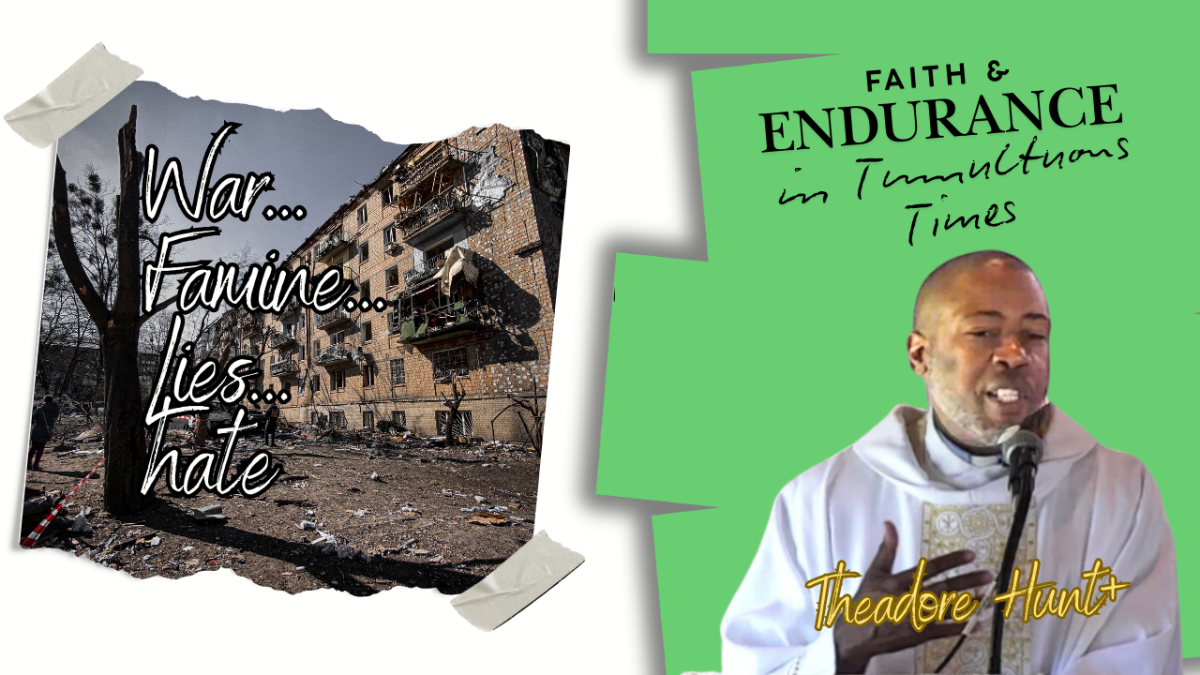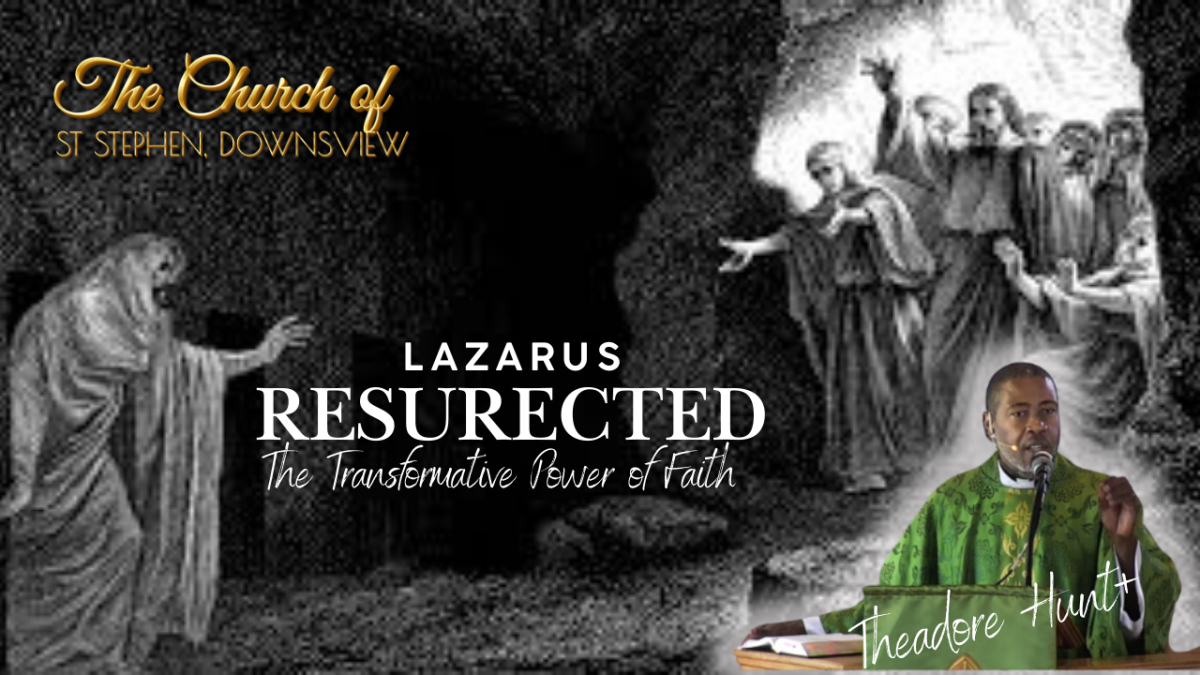Archive for November, 2024
Posted on: November 24th, 2024 by St. Stephens Downsview
Understanding the Kingdom of God
 We always run into problems when we try to align the kingdom of God with our national, racial, cultural, or political ideologies. It is not the same thing. It does not compare. Jesus said to Pilate that he came into the world to testify to the truth, and that everyone who belongs to the truth listens to his voice. Jesus’s kingdom is none other than the truth of God, which unmasks all of the lies, distortions, and corruptions of sin in this world. That’s why it undermines every other earthly kingdom. His battle is one of drawing to himself hearts, minds, and wills that have gone astray from the truth.
We always run into problems when we try to align the kingdom of God with our national, racial, cultural, or political ideologies. It is not the same thing. It does not compare. Jesus said to Pilate that he came into the world to testify to the truth, and that everyone who belongs to the truth listens to his voice. Jesus’s kingdom is none other than the truth of God, which unmasks all of the lies, distortions, and corruptions of sin in this world. That’s why it undermines every other earthly kingdom. His battle is one of drawing to himself hearts, minds, and wills that have gone astray from the truth.
Common Ground of Humanity
These basic human characteristics—our hearts, minds, and wills—we all have them, regardless of where you live, your culture, race, nationality, or political ideology. Hearts, minds, and wills are common to us all. Jesus’s kingdom is recognized by its witness to the truth that the one true and living God has indeed come to live among his human creatures. By that action, he has come to redeem us, save us, restore us in our relationship with God, save us from ourselves, and save us from our sin. As we look back in hindsight, and as we look around us in the present, the point, friends, is that God’s kingdom rule is already present. It is already at work in our midst. It is both present and coming into being if we only have eyes to see it.
The Treasure of the Kingdom
As I thought about this, I was reminded of the parables of the kingdom, the 13th chapter of Matthew’s gospel. Jesus compares the kingdom of heaven to a treasure hidden in a field, which someone finds and hides, then goes and buys that whole field. Or a merchant in search of fine pearls discovers one of great value and sells everything to buy it. In both instances, they sell all they have to obtain it and make sure not to lose this treasure they have found. In other words, there’s nothing more important or valuable on this earth than discovering the truth that the kingdom of God is present and coming into this world through Jesus Christ.
The Awakening
Being awakened to the reality that God’s kingdom is present and at work among us is like waking up from a deep sleep. You don’t even know you’ve fallen asleep until someone nudges you, and then you realize, “Oh, I fell asleep.” Awakening to the reality of the kingdom of God and his rule in our lives is like that, and there’s nothing of greater value in this life than that discovery. From that point forward, you don’t have to walk around like a zombie. You may indeed listen to Jesus’s voice, follow him as the way, the truth, and the life, and live from that point onward in loving service to God and one another.
Anticipation of Advent
When we get to Advent, the message is to keep awake and alert. Let us not fall asleep in lives apart from the truth of Christ. Over our diocese, we have been engaged in the process called “cast the net” based on Jesus’s post-resurrection appearance in John’s gospel. This requires the renewal of our spirituality—you cannot give what you do not have or lead where you have not gone. As the season of Advent approaches, I encourage you to join us for spiritual renewal opportunities.
Recognizing God’s Kingdom
Wherever you see the people of God commit to the daily renewal of their spiritual lives, study scripture, read, pray, sing, and share their faith, there you will catch a glimpse of God’s kingdom in those small things. What we celebrate at Christmas, the birth of our Savior, was known to only a few, yet God was at work quietly, powerfully changing history. His rule of truth and salvation is here, coming more into being. May God grant us grace to pass through the temporal to not lose the eternal kingdom.
Posted on: November 17th, 2024 by St. Stephens Downsview
 Some words from Mark’s gospel, chapter 13 verse 8. Jesus said, “This is but the beginning of the birth pangs.” To hear, see, and read stories from around the world today is to be exposed not just to the events taking place, but to a sensationalized version of them. This version of the news often aims to provoke our interest or excitement at the expense of accuracy. If we’re going to tell a story and make it catchy, sometimes details are left out.
Some words from Mark’s gospel, chapter 13 verse 8. Jesus said, “This is but the beginning of the birth pangs.” To hear, see, and read stories from around the world today is to be exposed not just to the events taking place, but to a sensationalized version of them. This version of the news often aims to provoke our interest or excitement at the expense of accuracy. If we’re going to tell a story and make it catchy, sometimes details are left out.
For more than a year now, we have heard and seen the news stories of the unfolding humanitarian crisis in Palestine. We have heard and seen the news about the ongoing Russian invasion into Ukraine and the continuing political and socio-economic crisis in Haiti, where planes can’t even take off or land without being shot at. As matters spiral out of control, we have also heard news from the COP29 conference in Azerbaijan discussing the disastrous impacts of climate change. We have become painfully aware of the plight of new immigrants being marginalized, blamed for long-standing issues such as healthcare and housing shortages, along with spiking food prices—and we could go on.
The Reality of a Shifting World
More often than not, as we receive news of peoples and nations rising against one another and of natural and man-made disasters, we may come away with the impression that our stable world is falling apart. It seems as though the bottom is falling out and the end is near. Growing up, I would often hear, “Whenever there’s a tragedy, the world is coming to an end.” Such news, especially when sensationalized, may leave us feeling anxious or panicked.
In our gospel reading, Jesus speaks to his disciples about the end, the coming of the Son of Man, and the beginning of the birth pangs. He says, “Beware that no one leads you astray. Many will come in my name and say ‘I am he,’ and they will lead many astray. When you hear of wars, rumors of wars, do not be alarmed. This must take place, but the end is still to come.”
Understanding the Present Circumstances
N.T. Wright, a retired Anglican Bishop, observes that today’s passage is not Jesus’s commentary about the end of the world. He argues that the passage addresses the present circumstances of Jesus’ disciples. Jesus was preparing them to endure a world without his physical presence, a world of false messiahs, wars, and upheaval in both natural and social orders.
This was a daunting prospect—a world marked by persecution and even death for those called by his name. Yet Jesus calls us not to be led astray or alarmed. He uses the analogy of birth pangs—painful, yet leading to new life—to encourage endurance.
A Call to Enduring Service
Jesus calls his followers to commit to serving God’s purposes over the long haul, even when we feel overwhelmed. We offer ourselves in service in many ways: through gracious judgments, considering others’ needs, offering a listening ear, and being slow to speak. We bear burdens, forgiving trespasses, and speak the truth of God’s word.
These forms of ministry are within reach for all. In times of conflict and turmoil, we are still called to serve. Our service arises from recognizing God’s mercy in our lives and remembering why God brought our community into being. We are not simply subject to random forces. Our actions matter in this world because God is already redeeming it.
Responding to God’s Call
So how is God calling you? How is He calling us as a community of faith to live? Where are those places where God invites you to serve—among the homeless, the hungry, or with friends going through loss? Perhaps at the side of a brother or sister facing challenges?
There are countless points of pain, and often the news only captures a portion. Yet God’s purposes are constantly crossing paths with these pains. These moments are not for us to simply observe but to serve, holding firm, and supporting His work in this world.
Let us not panic or be alarmed, but endure by coming alongside and serving. How is He calling you?
Posted on: November 11th, 2024 by St. Stephens Downsview
 Good morning, friends. It’s a privilege to gather with you again as we reflect on the 25th Sunday after Pentecost and commemorate Remembrance Sunday. Our gathering is an opportunity to pause amidst the momentous events unfolding around us, a chance to seek insight from the psalmist, who wisely noted in Psalm 127, “Unless the Lord builds the house, their labor is in vain.” These words remind us that, without divine guidance, our endeavors lack true significance.
Good morning, friends. It’s a privilege to gather with you again as we reflect on the 25th Sunday after Pentecost and commemorate Remembrance Sunday. Our gathering is an opportunity to pause amidst the momentous events unfolding around us, a chance to seek insight from the psalmist, who wisely noted in Psalm 127, “Unless the Lord builds the house, their labor is in vain.” These words remind us that, without divine guidance, our endeavors lack true significance.
Living Through Momentous Times
We are living in a period marked by uncertainty and change, both globally and personally. From the surprising reelection of political leaders whom many doubted, to the collapse of long-standing governments across continents, it seems societies everywhere crave change—perhaps in pursuit of a nostalgic past. However, these upheavals, exacerbated by the pandemic and ongoing wars, have left us questioning our future and the truth itself.
Economic pressures, rising costs of living, and environmental crises mirror this internal and global chaos. We find ourselves grappling with existential questions: What will become of me? How do I hold on to my identity and values?
A Call for Believers
These times prompt an essential question for believers: How do we not lose ourselves? How do we anchor our lives on the truth that is found in Jesus Christ, while navigating a tumultuous world? The scriptures remind us that God is actively working—establishing and preserving His heritage amidst chaos. The story of Ruth and Naomi exemplifies this truth, showcasing God’s providential care and purpose.
Through Ruth’s loyalty and Naomi’s determination, God ordained a future that went beyond their immediate concerns. They play a role in the lineage of King David, and ultimately Jesus Christ—a testament to God’s mysterious ways in history.
Faith Amidst Chaos
In today’s Gospel reading, Jesus reveals a profound lesson as He observes a poor widow’s generous contribution at the temple. It’s a reminder that our true character—our faith and generosity—is revealed, not in abundance, but in sacrifice. Like fresh squeezed orange juice, the true essence of who we are emerges under pressure.
This widow’s faith was not forged in her poverty or loss; it sprang from a deep-seated faith rooted in Israel’s God. Her generosity wasn’t for show but stemmed from genuine trust in God’s provision.
Our Identity in God
As chaos swirls around us, God anchors us. He reminds us of who we are—children created in His image—and whose we are—belonging to Him. Our identity is not confined to the labels of societal groups or determined by our circumstances. Ultimately, it is God who sustains us, shaping our lives regardless of the world’s upheavals.
Looking to the Future
The days ahead may hold greater turmoil, yet believers are called to steadfast faith, anchored in Jesus, who is the truth and the life. By surrendering our lives to Him, our words, and deeds can become offerings of praise, reflecting God’s work within us and through us.
As we navigate these tumultuous and momentous times, remember that God is actively establishing His kingdom. Let us stand firm, confident in our identity as His heritage.
Prayer
God, our Redeemer, in sustaining the lives of Naomi and Ruth, you breathed new life into your people. May we, in turn, find restoration and nourishment by returning to you and acknowledging your sovereignty over all. We lift this prayer in the name of Jesus Christ, our risen Lord. Amen.
May these reflections encourage you as we journey through this complex, but divinely orchestrated world.
Posted on: November 4th, 2024 by St. Stephens Downsview
 We are delighted to have all of you here today, those present and those joining via live stream. I want to discuss with you an inspiring passage from John’s Gospel, specifically chapter 11, verses 39 to 40. Here, we explore the profound moment when Jesus raised Lazarus from the dead, a moment pivotal not only for creation but also in understanding our human life and faith in death.
We are delighted to have all of you here today, those present and those joining via live stream. I want to discuss with you an inspiring passage from John’s Gospel, specifically chapter 11, verses 39 to 40. Here, we explore the profound moment when Jesus raised Lazarus from the dead, a moment pivotal not only for creation but also in understanding our human life and faith in death.
The Miracle of Lazarus
Jesus commanded, “Take away the stone,” to which the worry arose: “Lord, already there is a stench because he has been dead for days.” Yet, Jesus reassured, “Did I not tell you that if you believed, you would see the glory of God?” This miracle of raising Lazarus challenges us to see beyond the physical narrative to the expressions of faith.
The Significance of the Miracle
This public demonstration of divine power attracted significant attention, much to the chagrin of religious leaders who conspired against Jesus to avoid Roman scrutiny. Lazarus, undeniably dead for days, should have produced a stench, yet none was present when the stone was removed. This absence of decay signified something profound and divine at work, validating Jesus’s teachings and revealing God’s glory.
Implications for Our Faith
Jesus’s prayer at the tomb, acknowledging God’s ever-present hearing, reinforces that even as Lazarus was bound by death, God’s love never faltered. The miracle depicts that death is not the end; it is part of a broader narrative in our journey with God.
The Promise of Resurrection
Lazarus’s resurrection foreshadows Christ’s triumph over death, reminding us of our ultimate resurrection. Baptism symbolizes this renewal, marking us as God’s own, joining us with Christ in life and death. This miracle signifies that despite any trial, the enemy does not have the final say—God’s word prevails.
Life in Baptism and Grace
Paul’s teachings illustrate that through baptism, we are immersed in Christ’s death and resurrection, leading to a rebirth as new creations. This divine act is not by our might but through grace, highlighting that even when dead in transgressions, God breathes life into us through Christ.
Called to be Saints
Our identity as Christians involves acknowledging our imperfections while striving to embody holiness through Christ’s sanctifying grace. Saints are not flawless beings but are those earnest in faith, continually rising from sin to pursue God’s righteousness.
Encouragement and Perseverance
As we navigate our spiritual paths, much like Austin and Amelia will, we lean on grace and community support. Acknowledging our need for repentance and renewal, we are reminded of God’s readiness to forgive, guiding us through life’s journey toward eternal life.
Conclusion
As we commemorate All Saints’ Day, let us find inspiration in the steadfastness of faith. Though we falter, we rise anew in Christ’s grace, relentlessly pursuing a life devoted to God. May this reflection reignite our sense of purpose, instilling hope in the promise of life eternal.
 We always run into problems when we try to align the kingdom of God with our national, racial, cultural, or political ideologies. It is not the same thing. It does not compare. Jesus said to Pilate that he came into the world to testify to the truth, and that everyone who belongs to the truth listens to his voice. Jesus’s kingdom is none other than the truth of God, which unmasks all of the lies, distortions, and corruptions of sin in this world. That’s why it undermines every other earthly kingdom. His battle is one of drawing to himself hearts, minds, and wills that have gone astray from the truth.
We always run into problems when we try to align the kingdom of God with our national, racial, cultural, or political ideologies. It is not the same thing. It does not compare. Jesus said to Pilate that he came into the world to testify to the truth, and that everyone who belongs to the truth listens to his voice. Jesus’s kingdom is none other than the truth of God, which unmasks all of the lies, distortions, and corruptions of sin in this world. That’s why it undermines every other earthly kingdom. His battle is one of drawing to himself hearts, minds, and wills that have gone astray from the truth.


